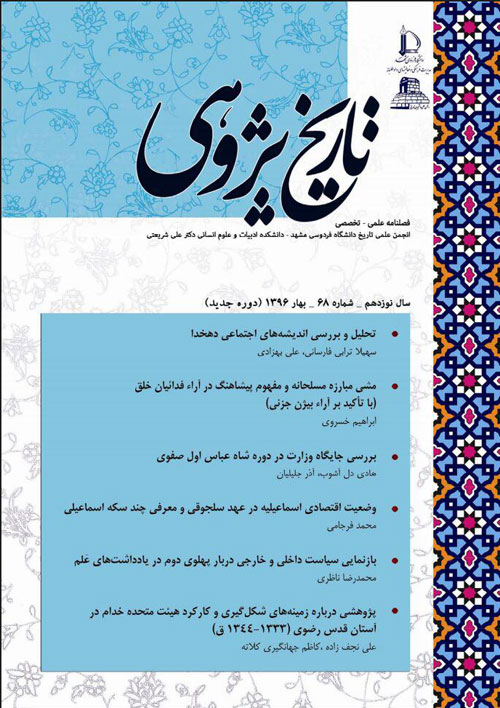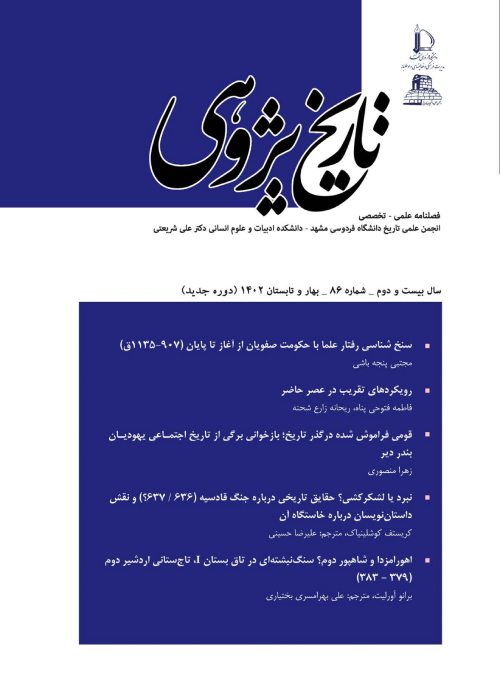فهرست مطالب

نشریه تاریخ پژوهی
پیاپی 68 (بهار 1396)
- تاریخ انتشار: 1396/03/27
- تعداد عناوین: 9
- گزارش
- معرفی آثار
-
Page 7Iran in Qajar Periods witnessed newfound developments. Foreign interference, poor economic conditions, split between traditional society and modernity were some of main factors in social and political decline. In such situation people like Ali Akbar Dehkhoda who were familiar with western modernity had a major role in intellectual developments among academics and intellectuals in Iran. Dehkhoda as a constitutionalist had a unique role in activities against social corruptions and Above all confronting illiteracy and the public's ignorance in Iran through his poems and other writings. Present article tries to draw out his social ideas and from his works.Keywords: Constitution, Dehkhoda, Social ideas
-
Page 33Fadaian-e Khalq (Nations Devotees) partisan movement was one of the branches of Toodeh party (Tudah, Communist) which left the party due to its different fighting policy. This movement mostly consisted of young people and had its own leaders and theorists including Masoud Ahmadzadeh, Amir Parviz Pouyan, Bijan Jazanis (1316 1354 /1941 1975)and Zarifi. The current paper is a descriptive analytical study which uses the library to investigate history. It aims to describe the causes of armed struggle policy, Bijan Jazanis theories and the function of the Pishahang according to him. Bijan Jazanis believed in armed struggle in cities and mountains and villages as the main policy of toodeh revolutionary movement but he also advocated political union and cultural policies and propaganda. Jazani called the leadership of the armed revolutionary movement the Pishahang and defined certain duties and function for this position. According to him, Pishahang one above revolutionary fighters because they must be prepared and seasoned, knowledge, well informed and ready to sacrifice. According to Jazani, it can be argued that leadership was a critical position in both toodeh and Fadaian-e Khalq party.Keywords: Bijan Jazani, Pishahang, Armed (Military) Struggle, Fadaian-e Khalq, Masoud Ahmad Zadeh
-
Page 57Premiership (Vezarat) was one of the main pillars of the bureaucracy throughout the history of Iran and had a special credibility in administrative, judicial and ceremonial affairs. In the beginning of the Safavid period, due to the conflict between pen men (Ahl-e Qalam) and sword men (Ahl-e Shamshir), the status of the minister was degrated. But with the consolidation of the Safavid government during the era of Shah Abbass and his confrontation with opposition forces within the government, once again the positon of Vezir or Etemad al-dola was recovered. Applying descriptive analytic method, this research tries to answer questions such as status of the Vezirs of Shah Abbass I and the impact of them on the Safavid government. It seems that by establishing security and power at the age of Shah Abbass, a new era in the promotion of Vezirs was begun.Keywords: Premiership (Vezarat), Shah Abbas I, Etemad al-dola, Ordoubady family
-
Page 83The Ismailis (alternatively: Ismailiayya, or the Assassins), a major branch of the Shiite Islam, emerged initially as a religious, political, and military movement during the fifth and sixth centuries (AH). They occupied the attentions of rulers for about 170 years and terrified them by their rage. Their fortresses spread out from Qohestan in the east to Arajan in southwest and Fuman in the north. However, they created an independent social, cultural and economic structure for themselves in the middle of the Seljukid Empire. They even minted their own distinct coins in Alamut. This article describes the economic circumstances of the Ismailis and gives an account of their minting.Keywords: Ismailis, coinage, economy, Seljukids
-
Page 105In historiographical study of memoirs, two things should be noticed: Interval between the events and their recording and the role of author in the events. Memoirs of Asadollah-e Alam is considerable in both of these aspects. They include negotiations in the Pahlavi court both about domestic and foreign affairs. This study tries illustrate these subjects in seventh volume of Alams memories through a descriptive-analytical approach to clarify Pahlavis domestic and foreign policies. The role of court in elections and interfering in all political, cultural, academic and economic affairs domestically and direct interference are the main findings in this study.Keywords: Second Pahlavi, Alam, Court, Domestic Policy, Foreign Policy
-
Page 137Following the Constitutional Revolution in Iran, Astan-e Qods servants (Khoddam) like other social guild groups established their own union. Astan Quds Razavieh Society, Reformist Board of Astan-e Qods Razavi, United khoddam Board, Board of Sadat Razavi, Hezbollahi Dedicated Board of Astan-e Qods and Ugenda Reformist Board of Astan-e Qods Razavi were some of these social unions. Among these, United Khoddam Board was the only one which lasted for about one decade ( 1334-1344).a decade. Present research considers activities of the United Khodam Board at the end of Qajar period through a descriptive-analytical method focusing on historical documents and press to illustrate causes and background of formation, members, function and achievements of the Board. It shows that the main reason of formation of the United Khoddam Board was the financial problems in Astan-e Quds during last three decades of Qajar era and consequently disappeared after financial and economic financial reforms in early Pahlavi period .Keywords: United Khoddam Board, Astan-e Quds, Reform, Mashhad


